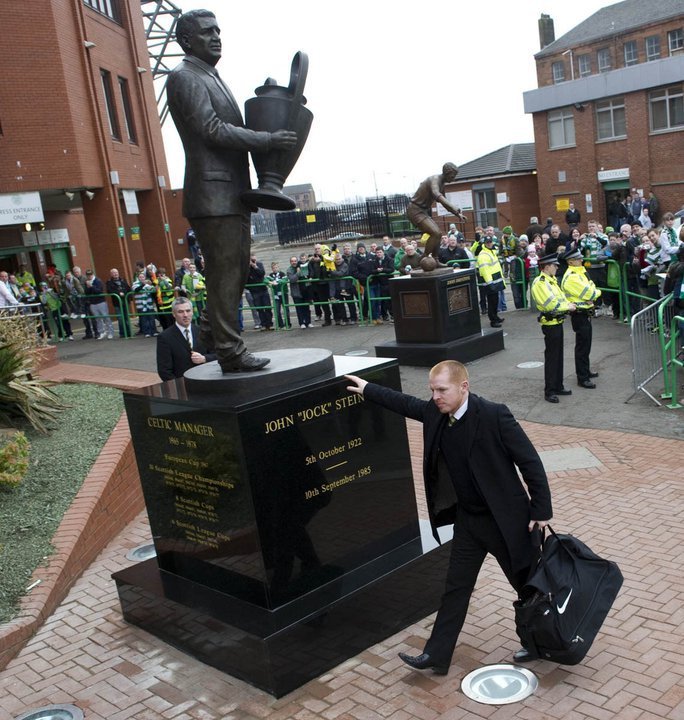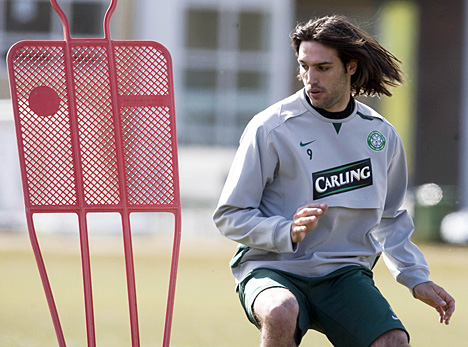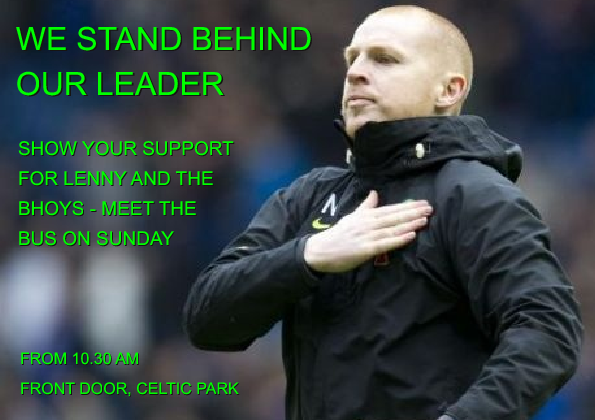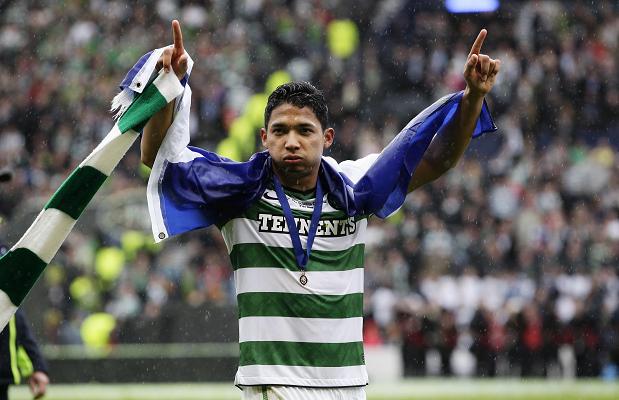Internet hate, “Old Firm party tunes”, Celtic fans’ abuse of El Hadji Diouf, Rangers chiefs in contrived bomb scare “following Celtic threats” (c. Daily Record) – all stories which have competed manfully for space in the news agenda as a result of sideshows to the main event. They concern certain instances which should of course in their own right be condemned, yet give every appearance of an attempt to muddy the waters of the main issue, and to create confusion around the motivating factors underlying an unparalleled explosion of hitherto dormant sectarian attitudes in 21st century Scotland.
Even more distressingly and going back further still, one only need recall the reams of bullshit punditry focusing on the “combustible nature” of Lennon the player, and the man, coupled with the ubiquitous allegation he “brings it on himself”, to get an idea of the latent prejudice and subconscious racism at work. Not least when you consider this representation is an outright fabrication.
Lennon’s disciplinary record as a player was no worse indeed a good deal better than that of most footballers anywhere. Off the field he is by all accounts according to those who know him best an intelligent, warm and approachable individual who has shown remarkable grace and restraint in all his years attempting to function in a city which can all too often prove a simmering hotbed of hostility and resentment. In this case to the extent where violence becomes a feasible option for the lunatic fringe, as Lennon the earlier victim of death threats and street assaults could already testify to, long before this latest round of cack-handed moralising kicked off in the media and Holyrood following the relatively mild affair of a touchline spat with an opposition manager.
Yet this lie has been allowed to take hold down the years and only now are we seeing the shocking extent of its insidiousness, and its oxygenising effect on those elements within our society whose only currency for self-expression is to direct sheer venom at others. We have long since passed the point at which it became a recurring experience for ordinary Celtic supporters to find themselves having to defend the manager against the casual stereotyping and lazy accusations of even merely occasional observers or non-football supporters, for whom the instinctive, kneejerk response is to piously lament the presence of the victim in this whole affair. He is a man whose petty antagonistic nature they have come to take as given after years of relying solely on the woeful agenda-laden sheen applied to events by our old media.
Going back to his playing days in hoops – during which spell a disciplinary record of two sendings off in seven seasons was thoroughly unexceptional never mind bordering on criminal as some would attempt to infer – the Irishman has been regularly portrayed in print and beyond with the use of such adjectives as ‘combustible’, ‘unpredictable, ‘volatile’ and ‘explosive’.
As well as giving one cause to truly shudder in light of more recent applications of the same terms, it’s also a presentation which for all intents and purposes appears to bear no relation whatsoever to the observable facts of Lennon’s personality, whilst having everything to do with the kind of deep-seated stereotyping peculiar to sections of Scottish society when it comes to the curious breed of some fiery, ginger-heided, ‘regularly outspoken’ Irish Catholic.
Only very recently we were afforded a decent case study, when, as fate would have it in the unfolding of events following the Old Firm “shame game”, the sanctioning of Rangers players El Hadji Diouf and in particular Madjid Bougherra, for placing hands on the referee whilst forcefully protesting a red card decision, threw up comparisons with a similar incident involving Lennon at Ibrox in 2005.
The level of media scrutiny of both events may have been similar but once we come to the actual substance of the reporting there all similarities end. In Lennon’s case, the player was roundly pilloried as the column inches gave way to all the usual hackneyed conventions in place regarding Celtic’s perennial loose cannon (sent off on the day for the first time in his SPL career, as it happened) – including a piece from one Alastair McCoist urging swingeing punishment as a means of future deterrent, the kind of response normally reserved for repeat offenders or proven lost causes. You don’t need to take my word for it – here is Phil Gordon’s excellent appraisal of the laughable media outcry which descended immediately upon the player at the time of his first offence.
The case involving Bougherra, on the other hand, was met by and large with pleas from mainstream media figures for calm and perspective, whilst those calling for equal punishment in light of SFA precedent were commonly dismissed as indulging in ‘tit for tat’ warfare, something which the call-in gurus would pass off as the duty of all reasonable observers to rise above. Going by the eventual outcome, and comparing it with the treatment meted out to Lennon six years earlier, it seems fair to presume the SFA’s own disciplinary committee were swayed by either that or a near identical argument.
Indeed allegations of ‘tit for tat’ behaviour amongst supporters are the supreme irony, coming as they do from a fourth estate largely responsible for the invention of the utterly bizarre and arbitrary “each as bad as the other” mantra which has in recent decades come to dominate the mainstream discourse in all matters Old Firm and sectarian.
So much so that we recently reached a stage where the shop steward for Scotland’s policemen and women was able to remark, without challenge, on our national broadcaster, that “I’ve been in houses with pictures of King Billy on the wall, and houses with pictures of the Pope, so they’re both as bad as the other.” An observation so stunningly facile it’s difficult to comprehend the utterer being allowed near sharp objects unsupervised, let alone given a role in the fashioning of public policy in response to a critical social ill.
Meanwhile, as Tom Devine has repeatedly pointed out in a number of recent interviews – the kind of meaningful exposure for a voice of sanity and perspective which offers the first hint of a silver lining amidst the gloom in all of this – and as George Galloway also homed in on in an excellent article carried on this site and others, Les Gray’s fellow officers continue to fail in their duty to apply what is set down clearly in law when facing up to sectarian chanting in stadiums up and down the land, having done so for years.
Concurrently, mealy-mouthed whatabouttery abounds on the topic of so-called “widespread IRA chanting” amongst the Celtic support, a desperate measure to inject some sort of moral equivalence where none exists, which is not to even start on the legal pitfalls of attempting to press-gang political expression – however distasteful to some – in alongside sectarian anthems which meet the very definition of the offence of incitement to religious hatred.
That this is still seen in the mainstream not as an issue of law and order in accordance with clearly defined laws but rather still an area of “debate” betrays the deep-seated, institutional nature of the prejudices we are up against. No, the inescapable fact is that Lennon’s mere visibility, self-assuredness and above all else success as a public figure in this country has unleashed dormant age-old resentments, a creeping redneck culture effortlessly straddling class divisions and with it the kind of petty sniping, assumed mistrust and pious warbling amongst the chattering classes that can provide space for an extremist fringe campaign of violence.
We ought not to lose sight either of the role of officially appointed Rangers spokespersons and supporters representatives in the sequence of events up until now. Whether that be Martin Bain’s endless stream of Ibrox press releases containing little more than finger pointing and standard issue whatabouttery regarding the alleged sins of others whenever that club and the repeat offenders amongst its support are called to task for their own, or more worryingly than that even, the utterances of supporters trust representatives.
Comical yet deeply cynical figures the like of Stephen Smith are still regularly entertained by BBC Scotland despite the RST’s bare-faced lying in official statements regarding Lennon’s words and deeds during the ‘shame game’ stramash, a willing participant in an organised attempt to have mud stick by manufacturing a racism storm involving the Celtic manager where there was none, and who then, hilariously, went on to bleat without a hint of irony about the supposed hidden agenda and partisan motives of the anti-racism organisation FARE when their own supporters were brought to task for same, engaging in a smear campaign against family members of key campaigners. A task for which there were willing allies at the Herald and Scotland on Sunday.
Prior to all of this still, the RST publicly tarred the Celtic manager as “out of control” whilst media relayed their demands that the football authorities take action, all before the first bomb was even in the post or disciplinary measures had been brought to bear on Lennon. Incredibly, with those bombs and now attempted assault on the sidelines now a reality, these antecedent factors have been largely buried in mainstream reporting and commentary of the “Old Firm problem”.
More recently still, when pressed for so much as a simple acknowledgement of the club’s past sins in the shape of their sectarian employment policy on Radio Scotland by a member of the CU team, RSA president Andy Kerr’s frankly surreal response was that the existence of such a policy up until 1989 was “open to conjecture”. At the very least, you have to salute the guy for sheer nerve, but it speaks of an ingrained arrogance at the heart of the Quintessentially British Club’s habitually violent, oft-sanctioned, widely reviled following, a group of supporters who have to this day shown no appetite for the kind of self-examination, bloodletting and reinvention, which, whilst far from perfect in its implementation, at least characterised a great deal of Celtic’s rebirth under a willing Fergus McCann in the mid-to-late ‘90s.
But returning to the plight of Neil Lennon specifically, if it is his religion and/or ethnicity that is at the root of his suffering here, cry the cynics, how come other Irish or Roman Catholics to have featured in Scottish football (or Scottish public life) have endured no such ordeal? Therefore, rightly or wrongly, it can only possibly be down to his specific personality. In all the commentary and posturing to have characterised discussion in recent months, no single item of reasoning so spectacularly misses the point as this one.
For one, it fails to take into account the precedent set by the treatment of high profile Irish Catholic players in Scotland in the last few years alone, at grounds up and down the country, namely two to have made the decision to represent the Irish Republic professionally, Aiden McGeady of Celtic and James McCarthy of Hamilton. To omit their experiences – which in the case of the latter player was judged severe enough to warrant attention in the Dail during Foreign Ministers questions – from an assessment of the picture at large strikes me as myopic to the point of being wilfully ignorant.
Secondly, and more generally, the idea that discrimination and prejudice of any variety – in this case, ethno-religious – can exist in a society only in wholesale form, or not at all, is both ludicrous and contemptible. Without comparing the situations directly, it seems fair to say that the logical extension of this approach could easily be to dismiss the significance of the lynching of African Americans in the deep south or Jews in pre-war Germany on the grounds that for every one hanging there were still two going about their business quietly, meaning the plight of each victim can only have been personal, however misguided the perpetrators. Of course this warped take on the problem is without exception still accompanied by token hand-wringing, which serves to insult the intelligence of the audience even more. Journalists and politicians proffering it should be ashamed.
Were this situation not combustible enough in its own right, it’s fuelled some more by what is in the main platitudinous media coverage of Scotland’s slumbering ills whenever they are given occasion to burst periodically on to screen and print at a UK-wide level. This time around has been no different, with English commentators struggling to comprehend the issue and barely able to conceal their lack of interest in so doing anyhow. Lastly, we are saddled with a political class on both sides of the border adept in no more than tokenism and trained to look the other way.
Certainly, in over a decade playing his football in England, Lennon never invited this level of hatred, not to mention the appalling number of attacks verbal and physical he’s come in an equal number of years in Glasgow. Having now escalated to attempted murder, still we have a blame the victim mentality at play in many quarters – a simply incredible reflection on any modern nation, not least one in the heart of the developed world only this week making global headlines for altogether different reasons as it supposedly stands on the brink of a bright new dawn, the political architects of change keenly trumpeting their enlightenment values.
It is time for Scotland’s powerbrokers to put their money where their mouth is. For as fate would have it this has in many respects been a defining week in Scottish history, and a proud one at that, depending on your political viewpoint perhaps, though that would certainly be mine. But Peter Lawell is correct to draw attention in his statement yesterday to a gap in the popular narrative where Scotland’s once secret shame is concerned, and to essentially urge the political class and media to get a proper handle on the issue whilst discovering some long overdue integrity and honesty in the process – and fast. Events we have lived through this season would stain the reputation of any self-respecting nation.
As for Neil Lennon, he is quite simply a hero to Celtic supporters and his status as an all-time club legend assured were it not already by the historic tribulations to have marred his first full season in management. That is how it should be, and as we go into the season’s final game on Sunday having at least now come to terms with potential disappointment, there is also a tangible mix of pride and, perhaps most importantly of all, a tremendous sense of unity within the Celtic family.
I am given heart by the fact that, having never been more motivated to win a title, the response of everyone involved with the club has been such that I will now rarely have been less disappointed to lose one (something which I say having not yet given up the fight or conceded the possibility of an upset at Rugby Park on Sunday, however unlikely). This season has seen the Celtic support, on the whole, respond in an eminently mature and grown-up fashion to events that not long ago would have seemed beyond the comprehension of many.
It puts the football into perspective yet in so doing underlines tremendously the values which the club espouse beyond that, and as such its importance in our daily lives. Rarely have many of us felt so proud to be a fan, which has to count for plenty.
On the field, next season is shaping up as potentially having all the hallmarks of an 03-04 affair, a Celtic team welling with character, self-belief and talent, a manager unbeaten and unbowed, the victims of supreme misfortune and injustice, ready to exorcise some demons, and to do so in genuine style. There is indeed always hope, but strangely enough in what have been especially dark times, never moreso than at this very moment. Neil Lennon and Celtic stand firm and in my opinion on the brink of something special. Off the field, it is now up to Scotland whether it wants to join them.





